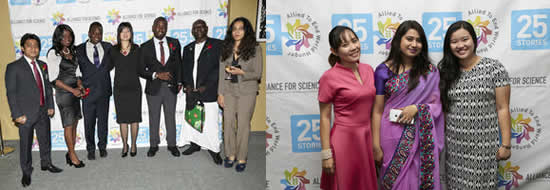
Cornell Alliance for Science Launches Global Conversation to End Hunger
November 25, 2015| |
The Cornell Alliance for Science converged in the United Nations Headquarters in New York City, on November 17 to launch a global conversation on ending world hunger. The Alliance's 25 newly graduated Global Leadership Fellows mingled with diplomats, journalists, academics, and science allies, sharing the personal stories that prompted them to embrace technological tools in the quest for food security. The Fellows, who represent 10 nations, had just completed a 12-week intensive course on science, communications, and grassroots organizing at Cornell University. They were the first cohorts in a pioneering program conceived by Cornell plant biologist Dr. Sarah Evanega and funded by the Bill & Melinda Gates Foundation.
"We must use the tools of science to end the disparity we see around the world," Evanega told the crowd of 100 persons assembled at the gala. "I'd like to work toward ensuring that every parent has the opportunity to put warm nutritious food in front of their children three times a day, and that every mother can both feed her children and send them to school."
The Fellows, who returned to their countries this week, will pursue the implementation of campaigns and communication strategies aimed at improving public understanding of the role that biotechnology and science can play in ending hunger.
Among those sharing their personal stories was Fr. Emmanuel C. Alparce of the Philippines, who said that millions of his countrymen are hungry. "I'm here because I believe biotech will improve the lives of my people, especially the farmers," he said.
Nassib Mugwanya spoke of how farmers in his home country of Uganda are suffering from hunger and economic setbacks because plant viruses are ravaging the essential cassava crop. Scientists have genetically engineered cassava to resist these viruses, but political activists have blocked its introduction. "Even though the solution is right in front of us, right within our reach, the legislative climate has not been right for farmers to have this crop on their farms," he said.

Read the original article at Cornell Alliance for Science website. For details, contact Dr. Sarah Davidson Evanega at snd2@cornell.edu.
| |
Biotech Updates is a weekly newsletter of ISAAA, a not-for-profit organization. It is distributed for free to over 22,000 subscribers worldwide to inform them about the key developments in biosciences, especially in biotechnology. Your support will help us in our mission to feed the world with knowledge. You can help by donating as little as $10.
-
See more articles:
-
News from Around the World
- Cornell Alliance for Science Launches Global Conversation to End Hunger
- Political Goodwill Key in Sudan's Adoption of Bt Cotton
- 'Orphan Gene' to Boost Protein Content of Staple Crops
- Synthetic Biologists Make Genetic Circuits for Programmable Plants
- Scientists Sequence Resurrection Grass Genome
- Filipino Students Learn about Modern Biotech Principles and Applications
- Role of Biotech Communication Highlighted in Philippine National Biotech Week
- "Off" Switch for Starch Production in Plants Discovered
-
Research Highlights
- The Role of PpMYB10.1 Gene in Anthocyanin Accumulation in Peach
- Enhancing Blast Disease Resistance by Overexpression of the OsCPK4 Gene in Rice
-
Beyond Crop Biotech
- Scientists Engineer Algae to Specifically Kill Cancer Cells
- University of California Scientists Create GE Malaria-Blocking Mosquitoes
- US FDA: GE Salmon as Safe to Eat as Non-GE Salmon
-
From the BICs
- Biotech Information Network Gathers for a Biosafety Seminar in Malaysia
-
Announcements
- Independent Professional Seed Association Annual Conference
-
Read the latest: - Biotech Updates (April 24, 2024)
- Gene Editing Supplement (April 24, 2024)
- Gene Drive Supplement (February 22, 2023)
-
Subscribe to BU: - Share
- Tweet
